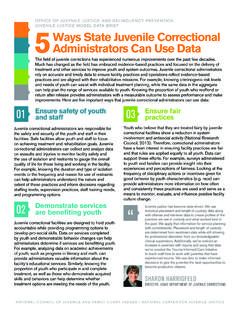Transcription of Implementing Effective Case Management Strategies: A …
1 Technical Assistance to the Juvenile Court BulletinImplementing Effective case Management Strategies: A Guide for Probation AdministratorsDouglas Thomas, Patricia Torbet, and Teri Deal National Center for Juvenile JusticeOctober 2011 PrologueThe information included in this guide is based on Building Pennsylvania s Comprehensive Aftercare Model. Probation case Management Essentials for Youth in Placement, a monograph produced by Pennsylvania s Comprehensive Aftercare Reform initiative funded by the Pennsylvania Commission on Crime and Delinquency (PCCD) and the John D.
2 And Catherine T. MacArthur Foundation s Models for Change The monograph suggested that probation departments develop a single plan that guides activities for youth in placement and aftercare supervision. It laid out a process by which probation officers assess, plan, facilitate, monitor and broker services, known as case Management Essentials or CME. Although developed with aftercare in mind, case Management essentials practices are applicable to all youth on probation, not just those in placement. The CME monograph identifies a set of tools that departments can use to enhance case Management practices.
3 Prototypes of these tools were created through a variety of activities, including NCJJ s series of White Papers and partnership with the Allegheny County (PA) Probation Department to develop a competency development needs assessment and case plan format. This work was largely based on the Desktop Guide to Good Juvenile Probation Practice that called for mission-driven, performance-based and outcome-focused With funding from PCCD to provide technical assistance and training, NCJJ partnered with four Pennsylvania juvenile probation departments Allegheny, Cambria, McKean, and Lehigh whose chiefs were committed to full, quality implementation of CME practices.
4 Each department designated the chief, deputy, or supervisor to coordinate and oversee planning and implementation and assembled a CME Implementation Team. Teams spent more than a year planning for implementation, requiring significant re-thinking, re-tooling, and re-training. Implementation of new policies, procedures, and protocols was staggered across the four pilot sites, generally occurring between mid-summer and early fall 2009. NCJJ assisted pilot counties by providing training to staff and helping the teams adapt CME tools and modify procedures or policies to support implementation.
5 Departments submitted case level data, including needs assessments, prior court history summaries, case plans, and case closings. This Special Projects Bulletin is designed to assist juvenile probation administrators to customize policies and pro-cedures, establish decision-making guidelines, develop instruments and forms, and other resources for the purpose of developing and Implementing Effective case Management practices in the context of local court/probation culture and statewide juvenile justice goals. The strategies discussed in this guide were developed and tested collaboratively by the Na-tional Center for Juvenile Justice (NCJJ) and four Pennsylvania counties Allegheny, Cambria, Lehigh and McKean.
6 The goal of the pilot was to demonstrate the usefulness of good practice, beneficial changes in probation departments, and ultimately bet-ter outcomes for youth. The process for field-testing the case Management strategies was highly interactive and intensive and led to critical refinements to the original strategy and several common lessons learned. Anyone may use one copy of this publication for educational or personal purposes. If you want to use this publication for educational or commer-cial purposes in print, electronic, or any other medium, you need NCJJ's permission.
7 If you want to alter the content or form for any purposes, you will also need to request NCJJ's permission. Office of Juvenile Justice and Delinquency Prevention1 Torbet, P. (March 2008). Building Pennsylvania s Comprehensive Aftercare Model. Probation case Management Essentials for Youth in Placement. Pittsburgh, PA: National Center for Juvenile Griffin, P., and Torbet, P. (Eds.). (2002). Desktop Guide to Good Juvenile Probation Practice. Pittsburgh, PA: National Center for Juvenile IntroductionProbation case Management is the sum of all activities that probation officers perform to assist juveniles in becoming law-abiding, productive, connected citizens who have made amends for the harm caused by their offenses.
8 Probation officers engage in case Management activities with the juveniles on their caseloads when they: Develop a case plan, Maintain regular contact with juveniles and their families,Identify and maintain collateral contacts,Promote juvenile and family responsibility,Coordinate community resources,Provide direction and guidance, Provide crisis intervention, Monitor residential and non- residential services, andMonitor placement and aftercare. What is Effective Probation case Management ? Effective probation case Management is a rational, systematic, and research-informed approach that provides a road map for probation staff to efficiently and effectively manage cases through the juvenile justice process while addressing documented risk factors and identified needs.
9 case Management occurs at key case processing/decision points, beginning with the intake decision and ending with case closing. Engaging in a standardized, structured process at each point helps officers make informed decisions so that cases referred to court can be handled equitably, consistently and differentially based on juvenile justice system goals and local options available. Effective probation case Management is predicated on adherence to a number of key principles, including:Structured Professional Judgment. Effective probation case Management gives structure and consistency to decision-making without eliminating professional judgment.
10 The skill, knowledge, and experience of qualified professionals should not be minimized or replaced. In fact, Effective case Management is simply enhanced traditional probation practice in which probation officers uniformly and consistently gather, organize, and interpret specific, relevant information and consider the available options for the best alignment with juvenile justice Assessment of Risks and Needs. Good probation practice requires the collection and assessment of information to manage youths based on their risk, needs, and accountability considerations and to inform decisions at key system points intake, pre-disposition, supervision/placement/aftercare, and case closing.







